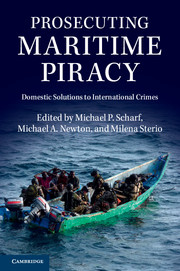Book contents
- Frontmatter
- Contents
- Contributors
- Introduction
- PART I DEFINING THE CRIME OF PIRACY AND ESTABLISHING JURISDICTION OVER THE CRIME OF PIRACY
- 1 The Governing International Law on Maritime Piracy
- 2 The Incorporation of International Law to Define Piracy Crimes, National Laws, and the Definition of Piracy
- 3 Exercising Universal Jurisdiction over Piracy
- 4 Incorporating International Law to Establish Jurisdiction over Piracy Offenses: A Comparative Examination of the Laws of the Netherlands, South Korea, Tanzania, India, and Kenya
- PART II THE PURSUIT, ARREST, AND PRE-TRIAL TREATMENT OF PIRATES
- PART III LEGAL ISSUES IN DOMESTIC PIRATE TRIALS
- PART IV SENTENCING AND POST-SENTENCE TREATMENT OF CONVICTED PIRATES
- Conclusion: Is There a Case for an International Piracy Court?
- Index
3 - Exercising Universal Jurisdiction over Piracy
from PART I - DEFINING THE CRIME OF PIRACY AND ESTABLISHING JURISDICTION OVER THE CRIME OF PIRACY
Published online by Cambridge University Press: 05 June 2015
- Frontmatter
- Contents
- Contributors
- Introduction
- PART I DEFINING THE CRIME OF PIRACY AND ESTABLISHING JURISDICTION OVER THE CRIME OF PIRACY
- 1 The Governing International Law on Maritime Piracy
- 2 The Incorporation of International Law to Define Piracy Crimes, National Laws, and the Definition of Piracy
- 3 Exercising Universal Jurisdiction over Piracy
- 4 Incorporating International Law to Establish Jurisdiction over Piracy Offenses: A Comparative Examination of the Laws of the Netherlands, South Korea, Tanzania, India, and Kenya
- PART II THE PURSUIT, ARREST, AND PRE-TRIAL TREATMENT OF PIRATES
- PART III LEGAL ISSUES IN DOMESTIC PIRATE TRIALS
- PART IV SENTENCING AND POST-SENTENCE TREATMENT OF CONVICTED PIRATES
- Conclusion: Is There a Case for an International Piracy Court?
- Index
Summary
INTRODUCTION
There is a lack of consensus about the extent to which universal jurisdiction can be validly applied or should be applied as a matter of policy. But notwithstanding the controversy and ongoing debate over which international crimes fall under universal jurisdiction, it is widely recognized that under customary international law, piracy is a jus gentium crime and hence is subject to international law. This recognition is unchallenged despite the general disagreement about what rationale justifies the application of universal jurisdiction to piracy. Currently, the applicable legal framework to combat piracy consists of several conventions, including especially the 1982 United Nations Convention on the Law of the Sea (UNCLOS), which retained the provisions relating to piracy of the 1958 Convention on the High Seas, as well as a number of UN Security Council and General Assembly resolutions, regional and sub-regional arrangements, and national efforts.
It is worth noting that a minority of states have provided for universal jurisdiction in their domestic laws by enacting legislation to criminalize piracy and to prosecute alleged pirates in their courts. Even among these states, such laws frequently require a traditional connecting factor for the exercise of jurisdiction, such as the physical presence of the accused in the state or the victim being a national of that state. States are also generally reluctant to prosecute captured pirates.
This chapter covers jurisdictional issues involved in national and international efforts to address the menace of maritime piracy, which poses a serious threat to commercial shipping. The next section discusses universal jurisdiction over piracy as customary international law. The section after that studies universal jurisdiction over piracy via treaties and the work of the United Nations. The lacunae in this legal framework are considered next, followed by the conclusion.
UNIVERSAL JURISDICTION OVER PIRACY AS CUSTOMARY INTERNATIONAL LAW
As a principle of customary international law, the universality principle or the universal jurisdiction doctrine authorizes a state to enact laws under which it exercises criminal jurisdiction over certain conduct when the traditional bases for exercising or asserting jurisdiction are not present.
- Type
- Chapter
- Information
- Prosecuting Maritime PiracyDomestic Solutions to International Crimes, pp. 54 - 74Publisher: Cambridge University PressPrint publication year: 2015
- 1
- Cited by



